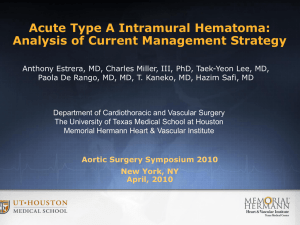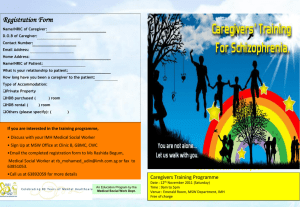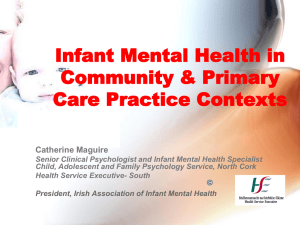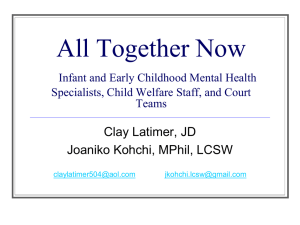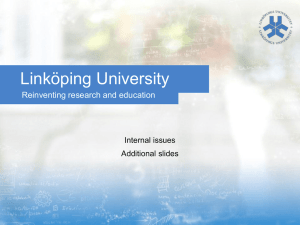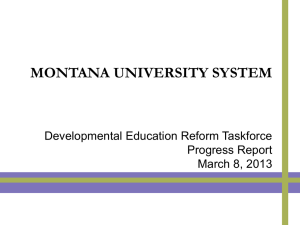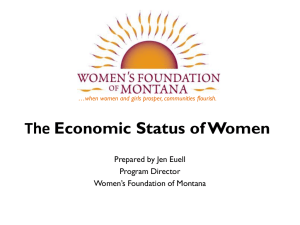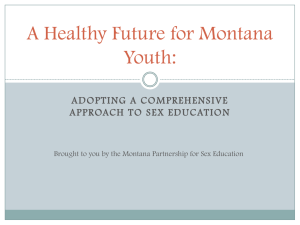Institute of Medicine and Humanities
advertisement
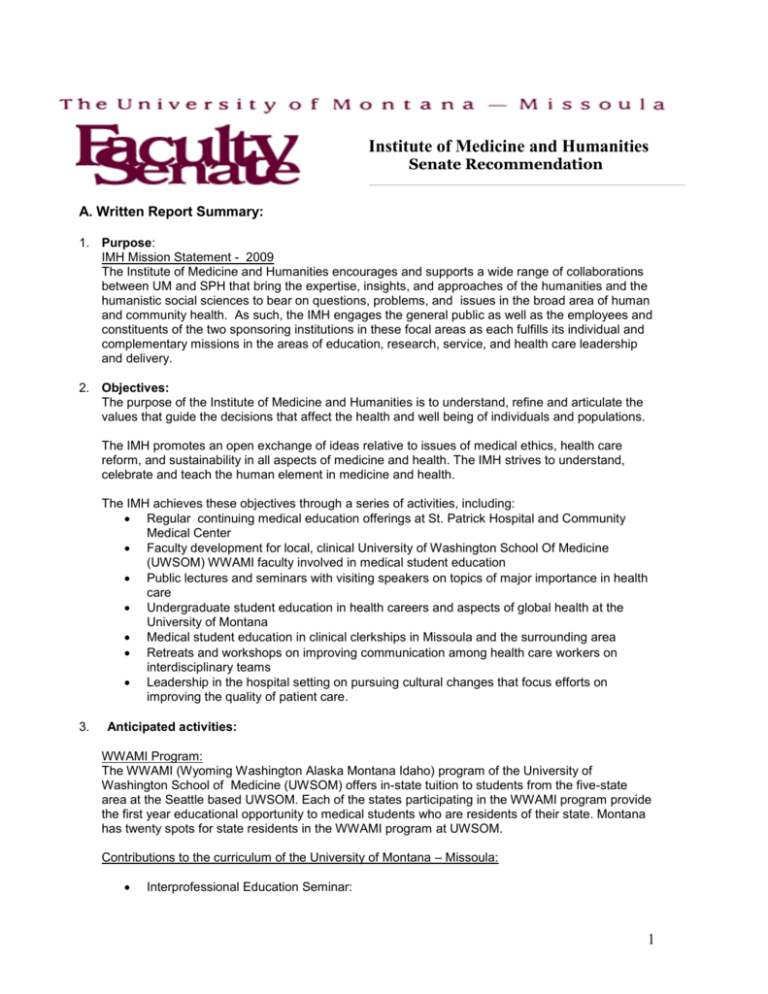
Institute of Medicine and Humanities Senate Recommendation A. Written Report Summary: 1. Purpose: IMH Mission Statement - 2009 The Institute of Medicine and Humanities encourages and supports a wide range of collaborations between UM and SPH that bring the expertise, insights, and approaches of the humanities and the humanistic social sciences to bear on questions, problems, and issues in the broad area of human and community health. As such, the IMH engages the general public as well as the employees and constituents of the two sponsoring institutions in these focal areas as each fulfills its individual and complementary missions in the areas of education, research, service, and health care leadership and delivery. 2. Objectives: The purpose of the Institute of Medicine and Humanities is to understand, refine and articulate the values that guide the decisions that affect the health and well being of individuals and populations. The IMH promotes an open exchange of ideas relative to issues of medical ethics, health care reform, and sustainability in all aspects of medicine and health. The IMH strives to understand, celebrate and teach the human element in medicine and health. The IMH achieves these objectives through a series of activities, including: Regular continuing medical education offerings at St. Patrick Hospital and Community Medical Center Faculty development for local, clinical University of Washington School Of Medicine (UWSOM) WWAMI faculty involved in medical student education Public lectures and seminars with visiting speakers on topics of major importance in health care Undergraduate student education in health careers and aspects of global health at the University of Montana Medical student education in clinical clerkships in Missoula and the surrounding area Retreats and workshops on improving communication among health care workers on interdisciplinary teams Leadership in the hospital setting on pursuing cultural changes that focus efforts on improving the quality of patient care. 3. Anticipated activities: WWAMI Program: The WWAMI (Wyoming Washington Alaska Montana Idaho) program of the University of Washington School of Medicine (UWSOM) offers in-state tuition to students from the five-state area at the Seattle based UWSOM. Each of the states participating in the WWAMI program provide the first year educational opportunity to medical students who are residents of their state. Montana has twenty spots for state residents in the WWAMI program at UWSOM. Contributions to the curriculum of the University of Montana – Missoula: Interprofessional Education Seminar: 1 Davidson Honors College Pre-health Professions Course: Global Health Lecture Series and Seminar Course: Ridge Library: Funded by an endowment from an anonymous donor, the Ridge Library focuses on medical humanities and is located within the Center for Healthcare Learning at St. Patrick Hospital and Health Sciences Center. The collection is accessible through the Mansfield Library catalog system, and all students, faculty, and staff are welcome to utilize it. The Ridge Library Collection contains books, periodicals, and online data bases that reflect the IMH focus on ethics, the experience of illness, reflective medical practice, and global health. Ridge Research Award and the Ridge Symposium: IMH instituted the Ridge Research Award in 2005 granting $750.00 for original research to be done by students using the resources of the Ridge Library. Each scholarship winner presents a summary of their research at the Annual IMH Ridge Symposium in April. The symposium also hosts an invited speaker covering topics that connect health and healthcare to ethics and society. Continuing Medical Education: The IMH director and staff are directly responsible for managing the continuing medical education programs at SPH, including Tumor Board, Journal Club, and Friday Medical Conference (FMC). In 2008, the IMH established a connection between St. Patrick Hospital and Community Medical Center using the internet and the Elluminate program to show the weekly Friday Medical Conference in real time at both hospitals. UM Continuing Education facilitated this connection and assists by providing technical support and moderating the program. The IMH maintains a blog, http://www.imh4msla.wordpress.com, that contains links to our continuing education programs and other relevant information. April Ethics Month: As part of the CME programming we regularly designate April as "Ethics Month" and plan four Friday Medical Conference programs on ethics topics. 3a. Joint Sponsorship of Events with The University of Montana and Community Partners: UM Presidential Lecture Series and MOLLI: In October 2009, the Institute partnered with the UM Presidential Lecture Series and MOLLI to bring Dr. Marcia Angell to Missoula. Dr. Angell, the past editor of the New England Journal of Medicine and a lecturer at the Harvard School of Medicine and Community Health, gave two public lectures during her visit, one at St. Patrick Hospital on healthcare reform and one at the university on the ethical breaches of pharmaceutical companies. Dr. Peggy Schlesinger participated in the MOLLI course organized around Dr. Angell's talk. Western Montana Area Health Education Center (WMT AHEC): In April 2009, the IMH moved its offices to the Skaggs Building at The University of Montana to a shared space with the WMT AHEC. The Institute staff participated in an AHEC program to train high school health teachers from across Montana to teach health careers classes and begin job shadow programs. WMT AHEC wrote a grant for the IPE class that IMH supports and Dr. Schlesinger teaches. The grant was approved by the University of Washington School of Medicine Continuous Professional Improvement Committee in fall 2009. The WMT AHEC and the IMH have also worked together in helping to support a movement towards developing a Family Medicine Residency Program in Missoula. Center for Environmental Health Sciences: The Institute worked with Dr. Andrij Holian on a grant proposal that included medical students as assistants in medical research. UW School of Medicine: The Institute has brought students from the UW School of Medicine, the UM School of Pharmacy and Allied Health Sciences, and the MSU School of Nursing together in the Interprofessional 2 Education (IPE) Seminar. This seminar began during Spring 2009 semester and will have its second semester in Spring 2010. Center for Ethics: The Institute partnered with the UM Center for Ethics to bring speakers to present on both the ethics of healthcare reform and disparities in health to the university community. National Rural Bioethics Project: The Institute has supported the National Rural Bioethics Project at UM in their efforts to develop the Bioethics Certificate Program. MSU School of Nursing: The Institute partnered with the MSU School of Nursing sharing speakers on relevant topics and working together on the interprofessional education seminar with the School of Pharmacy and Allied Health. Davidson Honors College: The UM Davidson Honors College and the IMH have partnered in support and development of HC 395: Health Professions Preparation and Overview. Mansfield Library: All materials in the Ridge Collection at the St. Patrick Hospital library are available to the UM community through interlibrary loan and are cross cataloged. UM School of Pharmacy and Allied Health Sciences: The Institute has developed multiple connections with UMSPAHS through Dean Forbes beginning with his generous donation of office space for the IMH next to the WMT AHEC office. The IMH is also working on development of teams of pharmacy and medical students through iPHARM, and the IPE class spring semester 2010. UM Anthropology Department and DBS: The IMH co-sponsored Biol/Anth 395 during fall semester 2008 and 2009 with plans to incorporate this offering on global health into the regular curriculum for both undergraduates and graduate students. 4. Other organizations involved: The IMH is sponsored jointly by The University of Montana and St. Patrick Hospital and Health Sciences Center, as specified in the Memorandum of Understanding between these two organizations (Appendix 1). The IMH model is unique for medical humanities programs, since it is based not in an academic medical center but in an undergraduate university and a regional community hospital. As a nonprofit organization, the IMH operates under the direction of an Executive Board comprising of health care professionals, university faculty and administrators, and community representatives (see Appendix 6). In addition to the primary sponsoring organizations, the Institute maintains ongoing relationships with several other organizations, which include: The Center for Ethics at The University of Montana The National Rural Bioethics Project University of Washington School of Medicine – WWAMI Medical Education Program Community Medical Center The University of Montana School of Pharmacy and Allied Health Professions The University of Montana Davidson Honors College The University of Montana President’s Lecture Series Western Montana Area Health Education Center Montana State University School of Nursing Partnership Health Center Missoula City Club 5. Reporting line: The Institute of Medicine and Humanities director reports to St. Patrick Hospital CEO Jeff Fee and 3 UM President George Dennison, both of whom also sit on the IMH executive board. The WWAMI Oversight Committee is directly responsible for the WWAMI 3rd Year Track in Missoula and is comprised of one representative from UM, two representatives each from SPH and CMC, and one representative from Western Montana AHEC. The IMH executive board also provides general oversight for the WWAMI program. 6. Relationships with institutional mission and contribution to academic programs: The Institute of Medicine and Humanities contributes to the institutional mission of the University of Montana in a variety of ways: enhancing the undergraduate offerings of the university, providing support for several of the university’s outreach and community service efforts, and contributing to the training of health care professionals in the UM School of Pharmacy and Allied Health and the University of Washington School of Medicine and the MSU School of Nursing. Academic support: (see information listed under activites) Dr. Schlesinger teaches two courses every year at UM, one in the Davidson Honors College and one as an interprofessional education seminar for MSU nursing, UM pharmacy, and UWSOM medical students. In addition, the IMH supports the Global Health class - a combined offering of DBS and Anthropology. Dr. Schlesinger is a member of the pre- medical advising committee at UM and also serves on the Administrative Steering Committees of the Masters in Public Health program, the Center for Environmental Health Sciences, and the Montana Geriatric Education Center. 7. Similar programs: There are no similar programs in Montana or the region. The IMH is unique in a city without a medical school or a residency training program. 8. Budget: a. Current Faculty and Staff Dr. Schlesinger is a .75 FTE contract employee with the IMH and receives no benefits from any institution. Her contract is negotiated with SPH. This .75 FT position includes a .25 FTE WWAMI position funded by a yearly assessment for the WWAMI central office from the three participating institutions - SPH, CMC, UM. The remaining .5FTE of the total IMH salary is split 50/50 between the UM and SPH. Salary and benefits for Megan Twohig, the IMH/WWAMI Program Coordinator, are supported entirely by St. Patrick Hospital and Health Sciences Center. b. The Institute’s operating budget, telephone and computer equipment are provided by St. Patrick Hospital. The rent, and furnishings are provided by UM. The IMH serves as a resource to the Mansfield Library by maintaining the Ridge Library Collection, which is housed at St. Patrick Hospital in the Center for Healthcare Learning. c. The IMH receives operating support from both the hospital and the university. Two endowment funds allow program enrichment, and additional support is sought from grants and private donations. Since the Institute’s founding, the hospital has provided the majority of the support for the IMH. Sources of Funds Saint Patrick Hospital and Health Sciences Center Executive Director salary – 50% Coordinator salary - 100% Office operating expenses - 50% 4 University of Montana Executive Director salary – 50% Office operating expenses – 50% WWAMI Oversight fund - held at SPH foundation SPH, CMC, UM each contribute equally to this fund 30% of IMH director salary comes from this fund Endowments IMH endowment: a general endowment, revenue from which can be used to support: o Program expenses Ridge endowment: a restricted endowment, revenue of which supports: o The Ridge Library collection – serials and monographs dealing with the medical humanities o Ridge Scholarship o Ridge Symposium Projected Expenses – IMH Expansion – Per Year Over 5 years: Salaries: RN JD MD PhD PhD 3 Support Staff Sub - Total $60,000 $80,000 $100,000 $60,000 $60,000 $100,000 $460,000 Operating Expenses Total $24,000 $484,000/year 9. Future Plans a. In the next five years, the Institute expects to grow and change to become a regional, scholarly, academic center for the study of bioethics in medicine within The University of Montana. This will require substantial increase in the support staff and the academic staff to address the growing need for academic bioethics teaching, consulting and research within our university and western Montana. The IMH will become a think tank - advising the AHEC on program possibilities and collaborative efforts in the region, identifying opportunities for integration into hospital ethics committees and health professions school curricula as well as keeping the rudder on track, steering a course of integrity as we navigate the effects of tumultuous health care reform efforts. The possible benefits that could arise out of collaboration between the IMH and the National Rural Bioethics Project, and the Center for Ethics on the UM campus, are limitless. The IMH can inform schools of law, nursing, and medicine on bioethical implications of health care topics, and produce public programs that educate us all about the ethical issues in health and health care. The IMH can integrate into the sustainability effort on the UM campus around green initiatives in health care and the need for sustainable, healing, work environments. b. We propose that the IMH become the Center for Bioethics at UM over the next five years with a medical bioethicist, nurse bioethicist, lawyer bioethicist and other interested academicians working together on scholarly projects. This will need the support of 3 support staff positions and office space for 8 with conference area nearby. The cost of growing the Center for Bioethics will be borne 5 by grant funding and assistance from the IMH endowments as well as fundraising for the new Center. c. Support from the two granting agencies, UM and SPH, up to this point has been invaluable. This level of continuing support will allow the IMH to continue its work while changes are taking place and the organization grows in size and scope. See Appendix 8 for an IMH vision written by the current Executive Board Chair, Randale Sechrest, MD. B. Review and Approval Process 2. The Faculty Senate through its Chair, who in turn shall distribute it to ECOS and other committees, and approve or disapprove the proposal by a vote of the Senate. Review in terms of Scope as stated in academic policy 100.0 To provide instruction, scholarship, or service to the University, state or world by: (1) focusing attention on an area of strength and/or addressing a critical issue, or (2) facilitating collaborative, multidisciplinary endeavors to combine resources from several programs or institutions to address issues of common interest. Review in terms of the University’s mission. Comments: This remains a model program for a Center. Does ECOS/Faculty Senate consider this center controversial? The IMH is not controversial, but it does continue to develop a relationships between the arts and medicine. At first blush, this seems a bit confusing, but the interactions between the Center and UM have developed in a synergistic manor that seems to be working well. Is the relationship with academic units beneficial? Absolutely. Dr. Peggy Schlesinger has taken over the Directorship and has incorporated academics, health professionals and students in a unique and valuable forum. Is the program revenue neutral or does it consume more resources than it generates? If so, is the use of University resources justified? IMH has three sources of $484,000 funding: St. Patrick Hospital and Health Sciences Center (55%); UM (37%); Community Medical Center (8%). The Center has been within its budget for its entire existence. The majority of revenue comes from non-UM sources (~63%) The contribution from UM (~37%) is well justified. Is the entity making progress toward objectives? The IMH is exceeding its objectives. Progress is outstanding. The list of activities, interactions with UM, many other institutions, conferences and speakers is most impressive. The interaction of IMH with the WWAMI program (Dr. Schlesinger is the local representative), the Davidson Honors College and the Pre-medical Sciences Program is extremely beneficial to UM. Recommendation: The Center is well described in the Periodic Review. The Center has met or exceeded all of its goals. It is strongly recommended that the Center continue to enjoy the support of the Faculty Senate. Justification: The Center is extremely well justified. The Center has been very active in the community, providing services to both patients and providers of health care and to the educational mission of The University. Dr. Schlesinger has expanded and developed a fine Center that brings the humanities to medicine and vice a versa. The Review provides a significant series of past and future activities community outreach, professional training and contributions to the curriculum at The University. The 6 Center has a distinguished Board membership and has presented a series of outstanding seminars. The Center’s revenue is generated by ongoing commitments from St. Patrick’s Hospital and Health Sciences Center, UM and Community Medical Center 7
